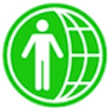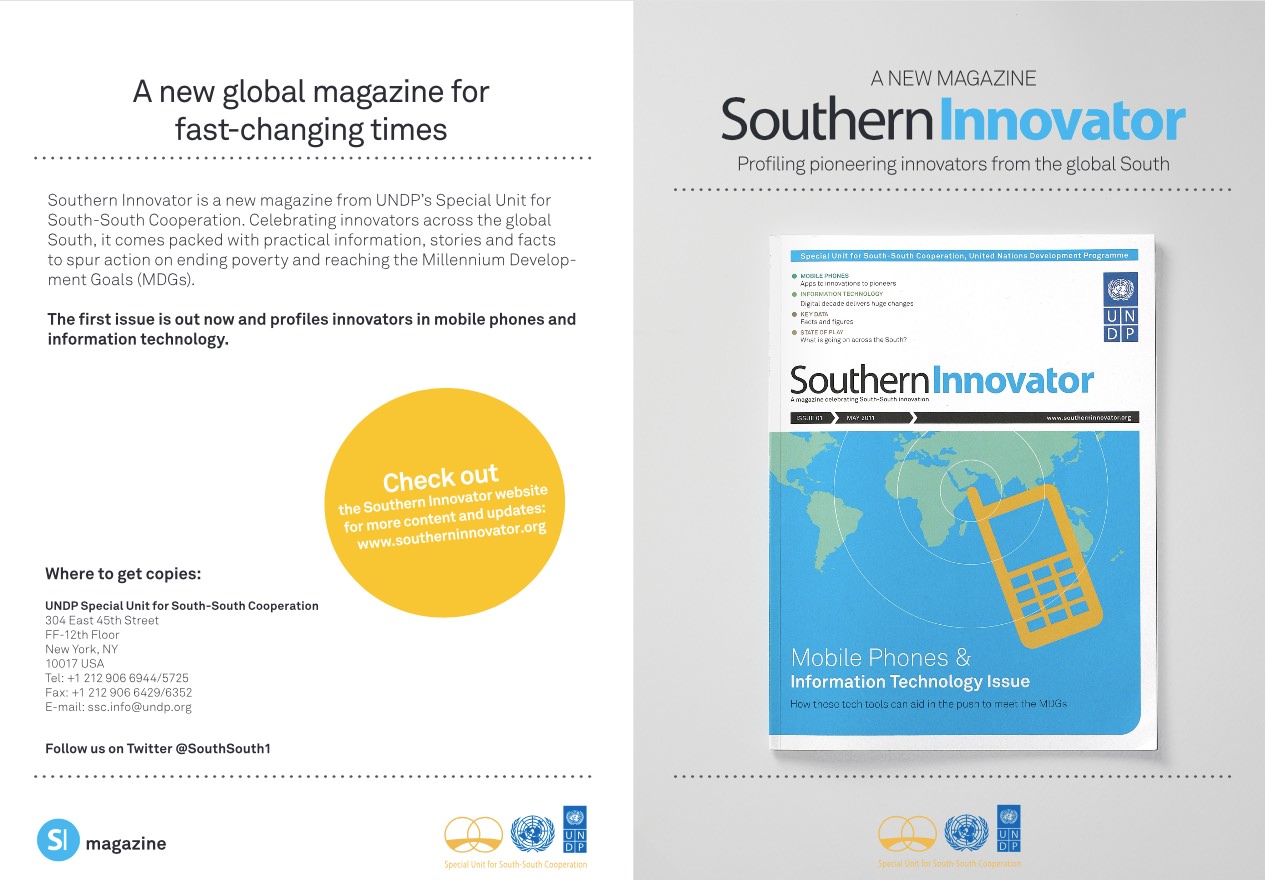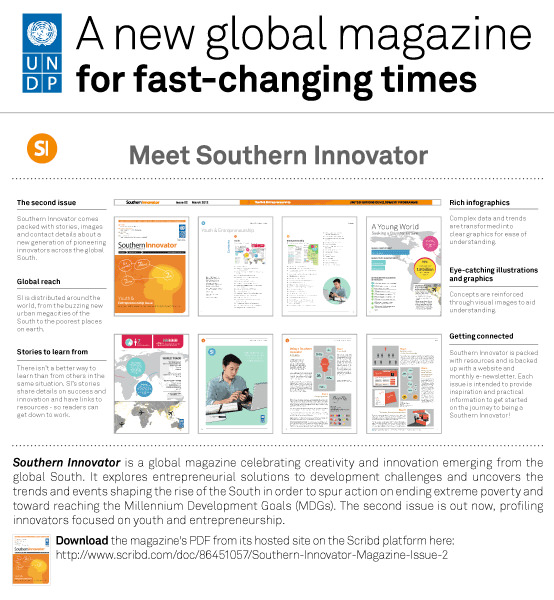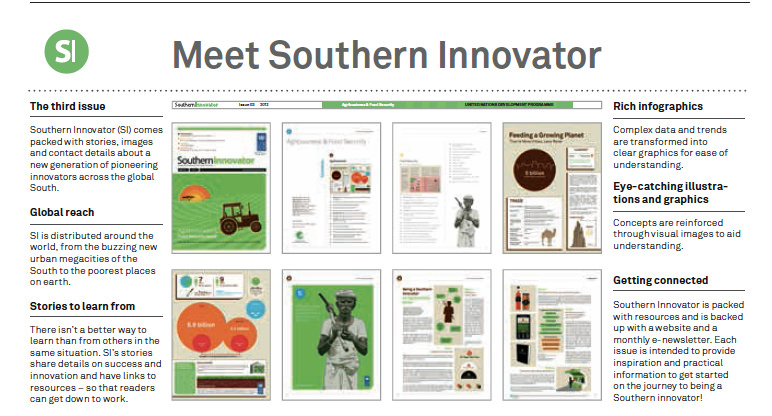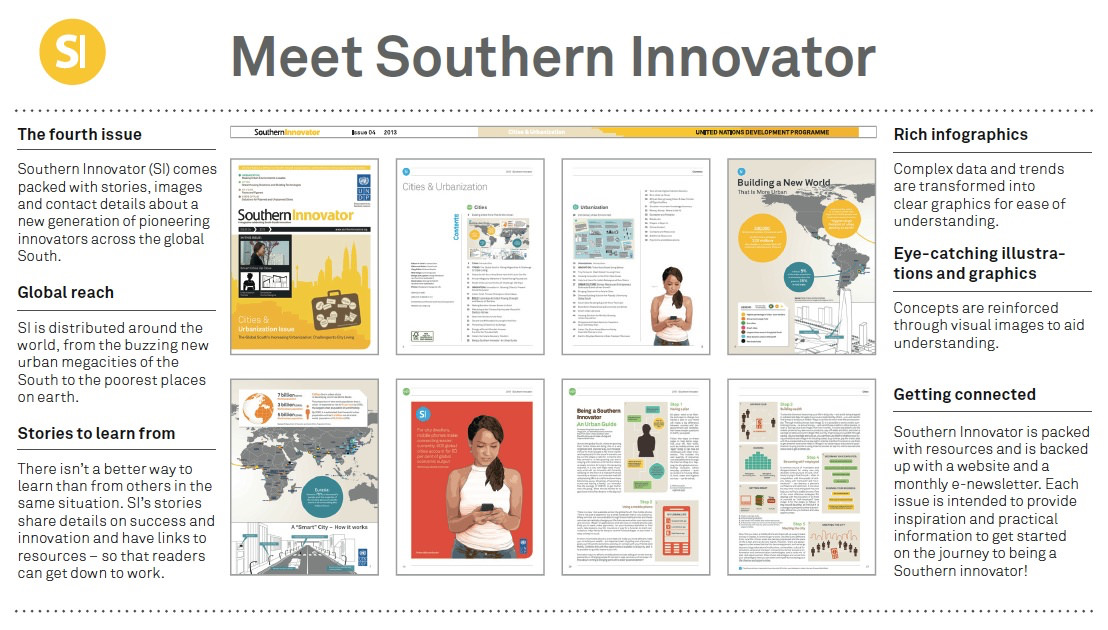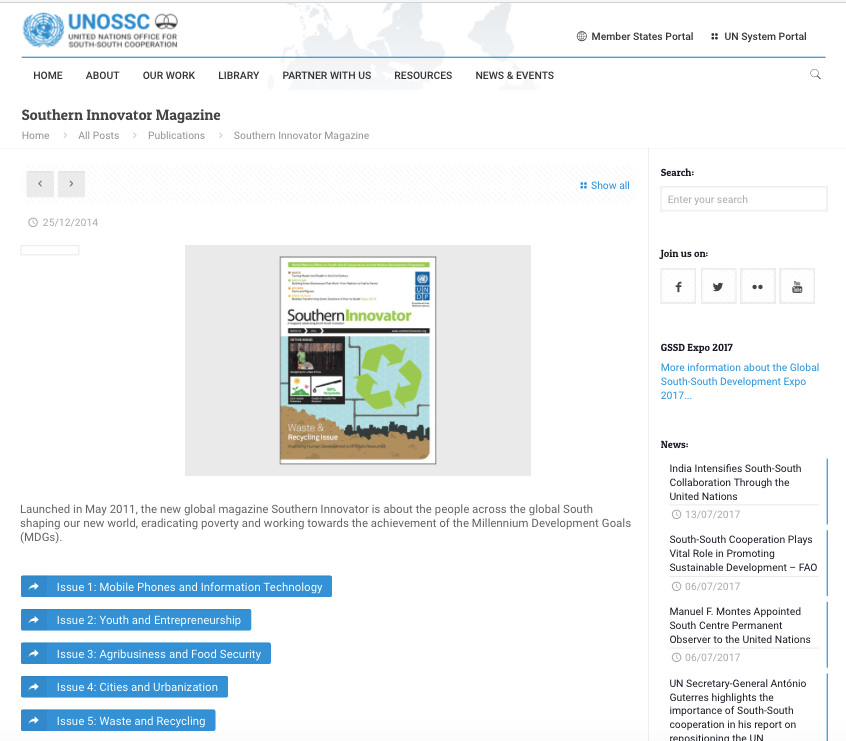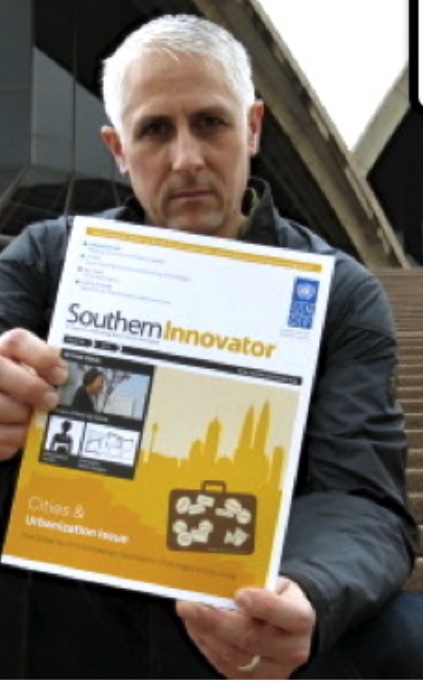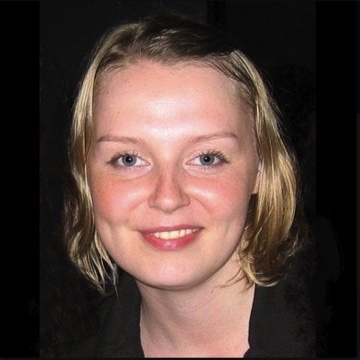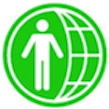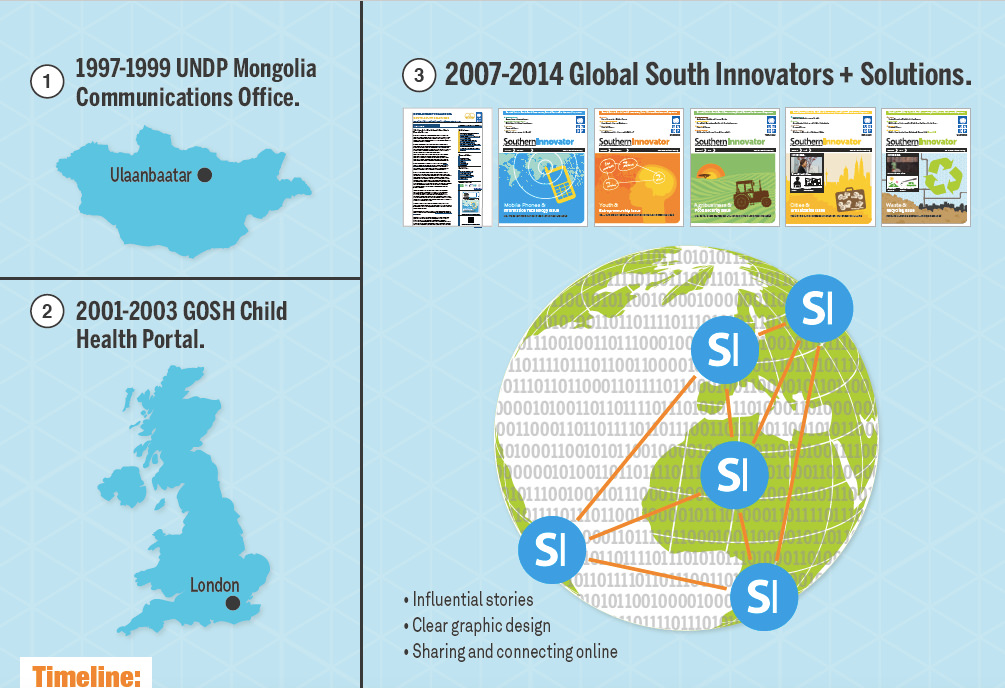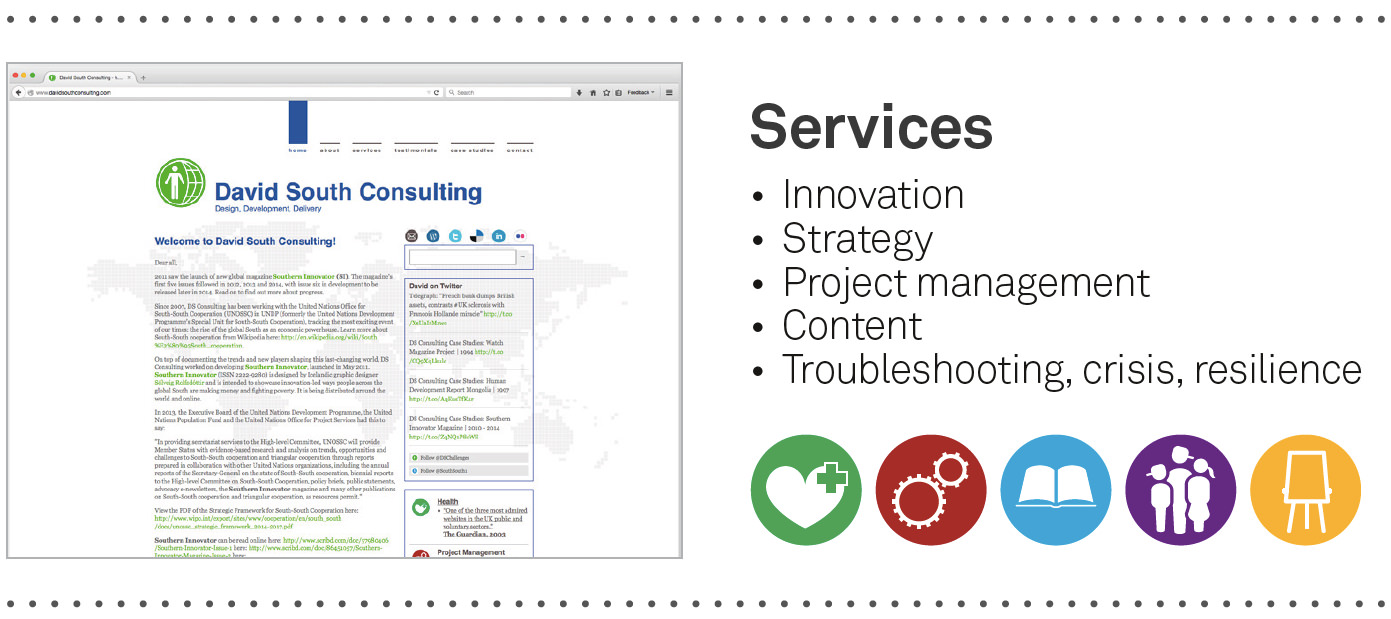Awards 1998-2003 | February 2020
 Wednesday, February 26, 2020 at 3:58PM
Wednesday, February 26, 2020 at 3:58PM UN/UNDP Mongolia Development Portal (www.un-mongolia.mn)
I launched this portal in 1997, in the middle of a major economic crisis in Mongolia. This award-winning (winner in 1998 of the People's Choice WebSite 500 award and the CyberTeddy Top 500 Website award) and pioneering United Nations Mongolia development web portal was singled out by UN headquarters as an example of what a country office website should be like.
At this time, Mongolia was still recovering from the chaotic and turbulent transition from Communism to free markets and democracy begun at the start of the 1990s, called by some "one of the biggest peacetime economic collapses ever" (Mongolia's Economic Reforms: Background, Content and Prospects, Richard Pomfret, University of Adelaide, 1994). There was a thirst for information: access to the Internet was still limited and access to mobile phones was just the preserve of the rich. As a legacy of the past, information, especially that about the outside world and the country’s true economic and social conditions, was restricted. During the years of Communism, even simple travel from one place to the next was strictly regulated.
While today we can take it for granted that the Internet, and mobile and smart phones, deliver the world’s information in seconds, this just was not the case in the late 1990s in Mongolia.
 "Cyber-Teddy's Top 500 Web Site" was an online award from the late 1990s.
"Cyber-Teddy's Top 500 Web Site" was an online award from the late 1990s.
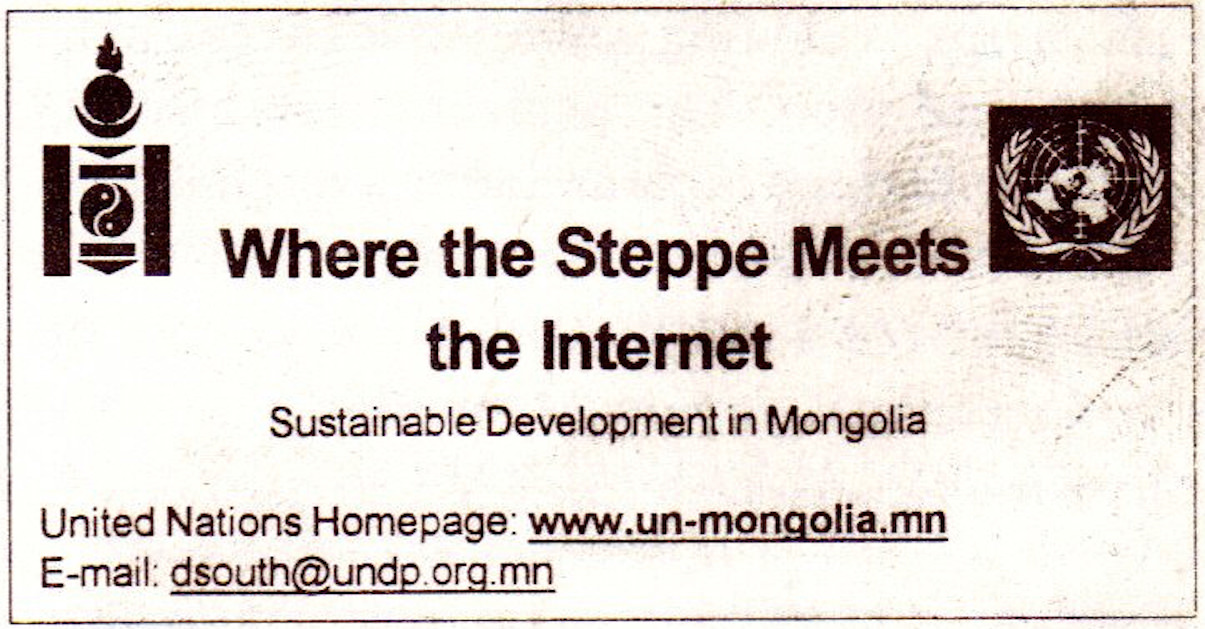 The UN/UNDP Mongolia development web portal addressed the urgent need to communicate what was happening in the country during a major crisis, and to transparently show what the UN was doing to address the crisis. It made critical data on the country’s development easy to find, and informed the wider world about the country and its people and culture. While the Internet had only just arrived in Mongolia, from the start the UNDP Mongolia Communications Office was experimenting with this powerful new technology to reach a global audience. This included Mongolia’s first web magazine, Ger (launched in 1998). After the www.un-mongolia.mn website launched in 1997, a media campaign began to inform readers of its presence. This ad appeared regularly in magazines, newsletters and newspapers.
The UN/UNDP Mongolia development web portal addressed the urgent need to communicate what was happening in the country during a major crisis, and to transparently show what the UN was doing to address the crisis. It made critical data on the country’s development easy to find, and informed the wider world about the country and its people and culture. While the Internet had only just arrived in Mongolia, from the start the UNDP Mongolia Communications Office was experimenting with this powerful new technology to reach a global audience. This included Mongolia’s first web magazine, Ger (launched in 1998). After the www.un-mongolia.mn website launched in 1997, a media campaign began to inform readers of its presence. This ad appeared regularly in magazines, newsletters and newspapers.
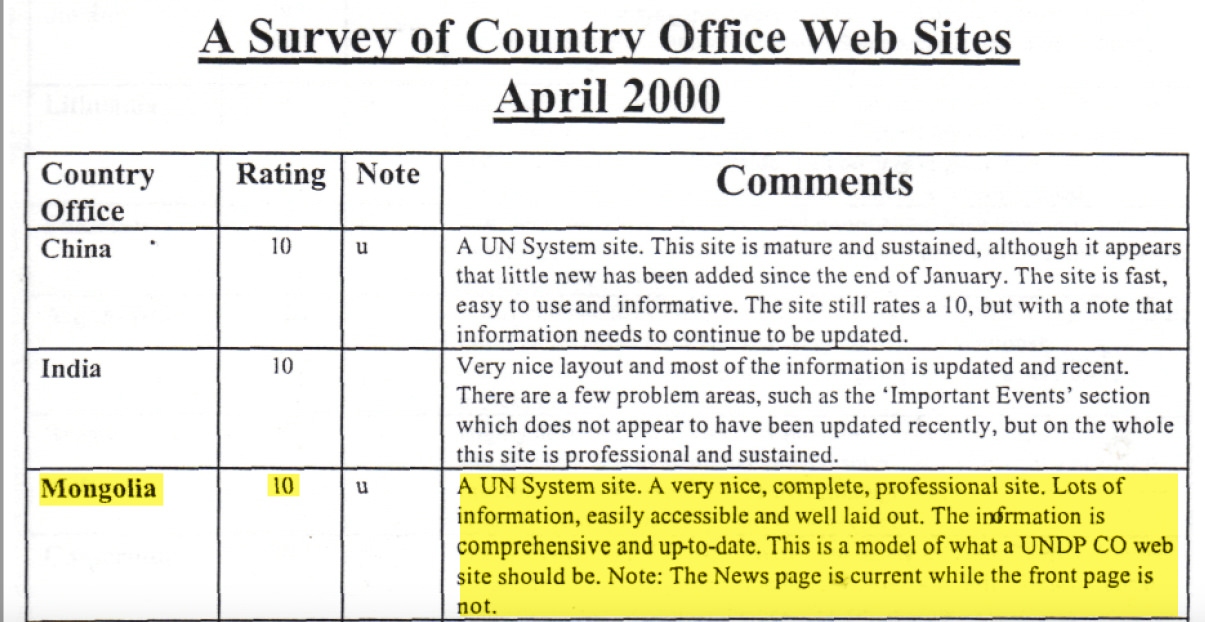 "A UN System site. A very nice, complete, professional site. Lots of information, easily accessible and well laid out. The information is comprehensive and up-to-date. This is a model of what a UNDP CO web site should be."
"A UN System site. A very nice, complete, professional site. Lots of information, easily accessible and well laid out. The information is comprehensive and up-to-date. This is a model of what a UNDP CO web site should be."
I was head of communications for the United Nations mission in Mongolia from 1997 to 1999. The mission had to primarily tackle three major crises: the country's turbulent transition from Communism to free markets and democracy, the social and economic crash this caused, and the Asian Financial Crisis (Pomfret 2000) (Quah 2003)*.
 UNDP Mongolia staff photo 1997. I served for two years as the UNDP Mongolia head of communications (1997-1999). I am sitting front row centre left of the UN Resident Coordinator Douglas Gardner.
UNDP Mongolia staff photo 1997. I served for two years as the UNDP Mongolia head of communications (1997-1999). I am sitting front row centre left of the UN Resident Coordinator Douglas Gardner.
Richard Pomfret said in 1994 "In 1991 Mongolia suffered one of the biggest peacetime economic collapses ever (Mongolia's Economic Reforms: Background, Content and Prospects, Richard Pomfret, University of Adelaide, 1994)."
From Curbing Corruption in Asia: A Comparative Study of Six Countries by Jon S. T. Quah: "The combined effect of these three shocks was devastating as 'Mongolia suffered the most serious peacetime economic collapse any nation has faced during this century'. Indeed, Mongolia's economic collapse 'was possibly the greatest of all the (peaceful) formerly'" Communist countries.
"The years 1998 and 1999 have been volatile ones for Mongolia, with revolving door governments, the assassination of a minister, emerging corruption, a banking scandal, in-fighting within the ruling Democratic Coalition, frequent paralysis within the Parliament, and disputes over the Constitution. Economically, the period was unstable and rife with controversies." Mongolia in 1998 and 1999: Past, Present, and Future at the New Millennium by Sheldon R. Severinghaus, Asian Survey, Vol. 40, No. 1, A Survey of Asia in 1999 (Jan. - Feb., 2000), pp. 130-139 (Publisher: University of California)
Writing in 2018, author John West found, in a chapter titled Mongolia's Corruption Curse (Transparency International and the World Bank had found corruption worsened in Mongolia after 2001), "In many ways, Mongolia has everything going for it. After being a satellite state of the former Soviet Union for much of the twentieth century, Mongolia regained its independence with the end of the Cold War. A relatively peaceful political revolution in the early 1990s ushered in a multi-party democracy and open society which have remained in place. ... And it is blessed with vast reserves of copper, gold, coal, molybdenum, fluorspar, uranium, tin and tungsten deposits. True, Mongolia experienced great upheavals as the breakup of the Soviet Union saw its trade decline by 80%. But Mongolia was also perfectly placed to benefit from the commodity super cycle driven by China, which is now the destination for the vast majority of its exports.
"However, despite much hype about the Mongolian "wolf economy", this country of so much promise is being dragged down by massive corruption. ...
"Mongolia's corruption is greatly weakening its attractiveness as an investment destination, is fracturing society and weakening its fragile political institutions. Its culture of corruption has also fed its love-hate relationship with foreign investors, which has destabilized the economy." Asian Century ... on a Knife-edge: A 360 Degree Analysis of Asia's Recent Economic Development by John West, Springer, 24 January 2018.
In this role, I pioneered innovative use of the Internet and digital resources to communicate the UN's work and Mongolia's unfolding crises. The UN called this work a “role model” for the wider UN and country offices. A survey of United Nations country office websites in 2000 ranked the UN Mongolia website I launched in 1997 and oversaw for two years (1997-1999), third best in the world, saying: “A UN System site. A very nice, complete, professional site. Lots of information, easily accessible and well laid out. The information is comprehensive and up-to-date. This is a model of what a UNDP CO web site should be.” (http://www.scribd.com/doc/274319690/UNDP-Mongolia-United-Nations-2000-Survey-of-Country-Office-Websites)
As part of a strategic plan to raise awareness of Mongolia’s development challenges and to spur action on meeting them, a Communications Office was established for the UN mission in 1997. Acting as a strategic hub, the Communications Office and its dynamic and talented team, were able to leverage the existing budget to spur action on many fronts.
In 2001, the UN won the Nobel Peace Prize for “their work for a better organized and more peaceful world” and its communications innovations, with work such as that in Mongolia being cited as a contributing factor to the awarding of the Prize.
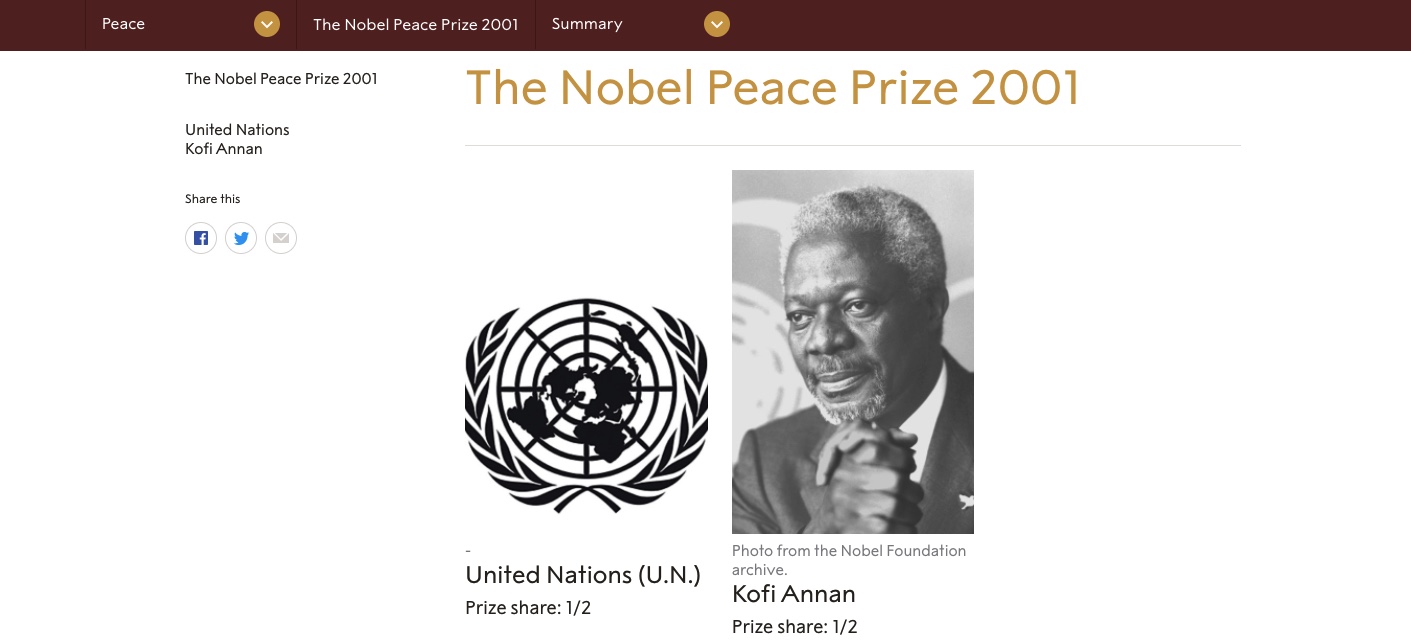 The Nobel Peace Prize 2001 joint winners.
The Nobel Peace Prize 2001 joint winners.
GOSH Child Health Portal (www.gosh.nhs.uk)
In 2001 I undertook a two-year contract to modernise the online resources for the Great Ormond Street Hospital for Children NHS Trust (GOSH)/Institute of Child Health (ICH). My strategy was inspired and informed by initiatives encountered while working as a health and medical journalist in 1990s Canada - a time where government austerity spurred a need to experiment and try new ways of doing things.
Having seen the impact first-hand of pilot experiments in Toronto aimed at widening access to information and resources for patients and their families, I applied this knowledge to the GOSH Child Health Portal Project (2001 to 2003). Drawing on the wider NHS Modernisation Plan, and a multi-year consultation process undertaken by the hospital, the Project was launched in three phases.
How far the UK had fallen out of step with global developments with the Internet became clear from the start. The distance that had to be traveled in the span of two years was vast. Essentially, to go from being a web laggard to a web leader.
Award-winning (http://www.scribd.com/doc/35249271/Childnet-Awards-2003-Brochure), the GOSH Child Health Portal was called by The Guardian newspaper one of the “three most admired websites in the UK public and voluntary sectors,” and a UK government assessment called the overall GOSH child health web portal a role model for the NHS. At the time, Prime Minister Tony Blair (whose wife, Cherie Blair, was an early supporter and champion of the project) had this to say: “Making sure that your child has helpful, easy-to-read information will make a significant difference to their time in hospital. I am sure that this website will prove very useful for children and their families.”
The project was delivered in three phases. At every stage, progress was communicated to the wider public and colleagues in various ways, via in-house media and through constant engagement with British news outlets. Screen grabs and other resources from the project can be found online here:
Phase 1: https://books.google.co.uk/books?id=g826gFjEXWsC&printsec=frontcover&dq=gosh+health+phase+1a&hl=en&sa=X&ved=0ahUKEwj5u__dqIHLAhVJOxoKHZ3IDZcQ6AEIJTAA#v=onepage&q=gosh%20health%20phase%201a&f=false
Phase 2: https://books.google.co.uk/books?id=E2ZVlFbrCzsC&printsec=frontcover&dq=gosh+health+phase+2a&hl=en&sa=X&ved=0ahUKEwjEodr0qIHLAhWK2BoKHStJB7QQ6AEIJjAA#v=onepage&q=gosh%20health%20phase%202a&f=false
Phase 3: https://books.google.co.uk/books?id=KVE6QqDp1HsC&printsec=frontcover&dq=gosh+health+phase+3&hl=en&sa=X&ved=0ahUKEwiXwe-FqYHLAhVBvxoKHXhOCooQ6AEIJjAA#v=onepage&q=gosh%20health%20phase%203&f=false
Project documents: https://books.google.ca/books?id=4aeDBgAAQBAJ&dq=gosh+child+health+portal+key+documents&source=gbs_navlinks_s
The Cable and Wireless Childnet Award called Children First “an outstanding example of how a hospital can create quality, authoritative information on issues relating to health in a fun, child-centered and accessible way.”
More here from The Guardian and CBS: Hospital unveils international website for children and Web Projects For Kids Get Their Due
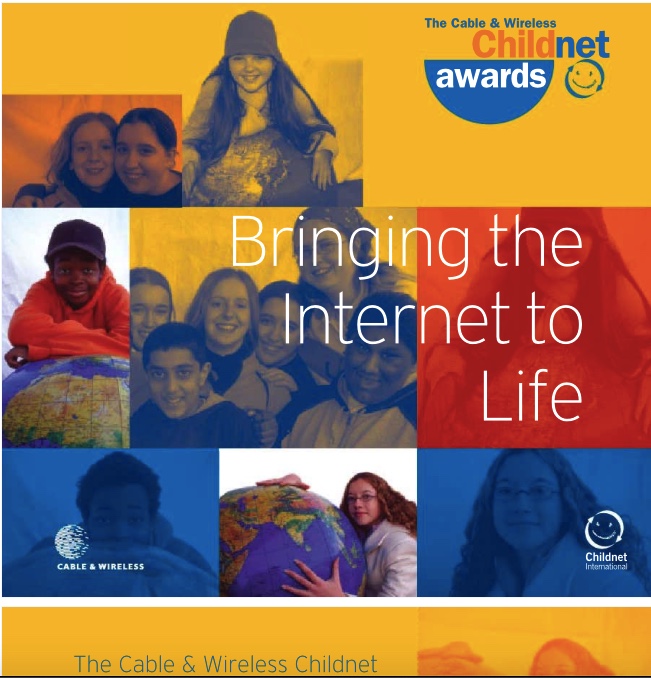 The Childnet Awards in 2003 were awarded by Trond Waage, the Norwegian Ombudsman for Children, at the Science Museum in London (and hosted by British media personality Carol Vorderman) (https://en.wikipedia.org/wiki/Carol_Vorderman).
The Childnet Awards in 2003 were awarded by Trond Waage, the Norwegian Ombudsman for Children, at the Science Museum in London (and hosted by British media personality Carol Vorderman) (https://en.wikipedia.org/wiki/Carol_Vorderman).
 The GOSH Child Health Portal team receive the Childnet Award in 2003 at London's Science Museum (Photo: CBBC Newsround).
The GOSH Child Health Portal team receive the Childnet Award in 2003 at London's Science Museum (Photo: CBBC Newsround).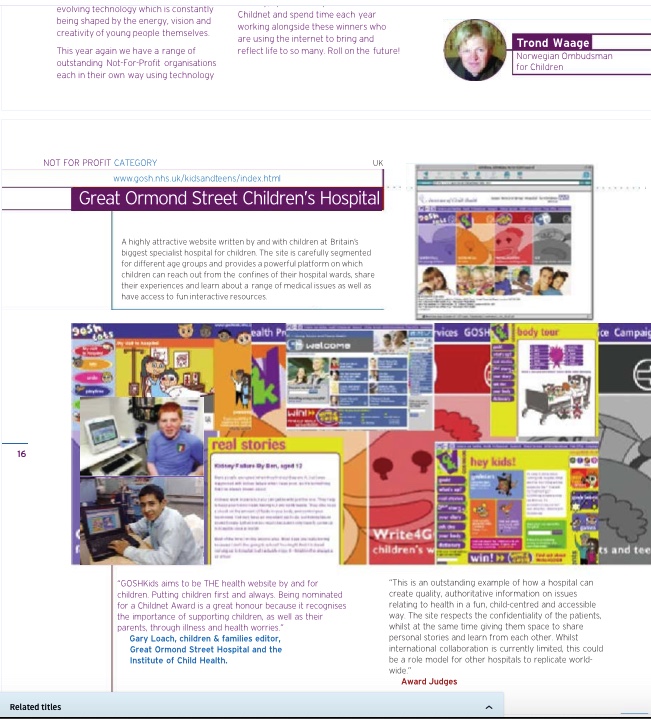
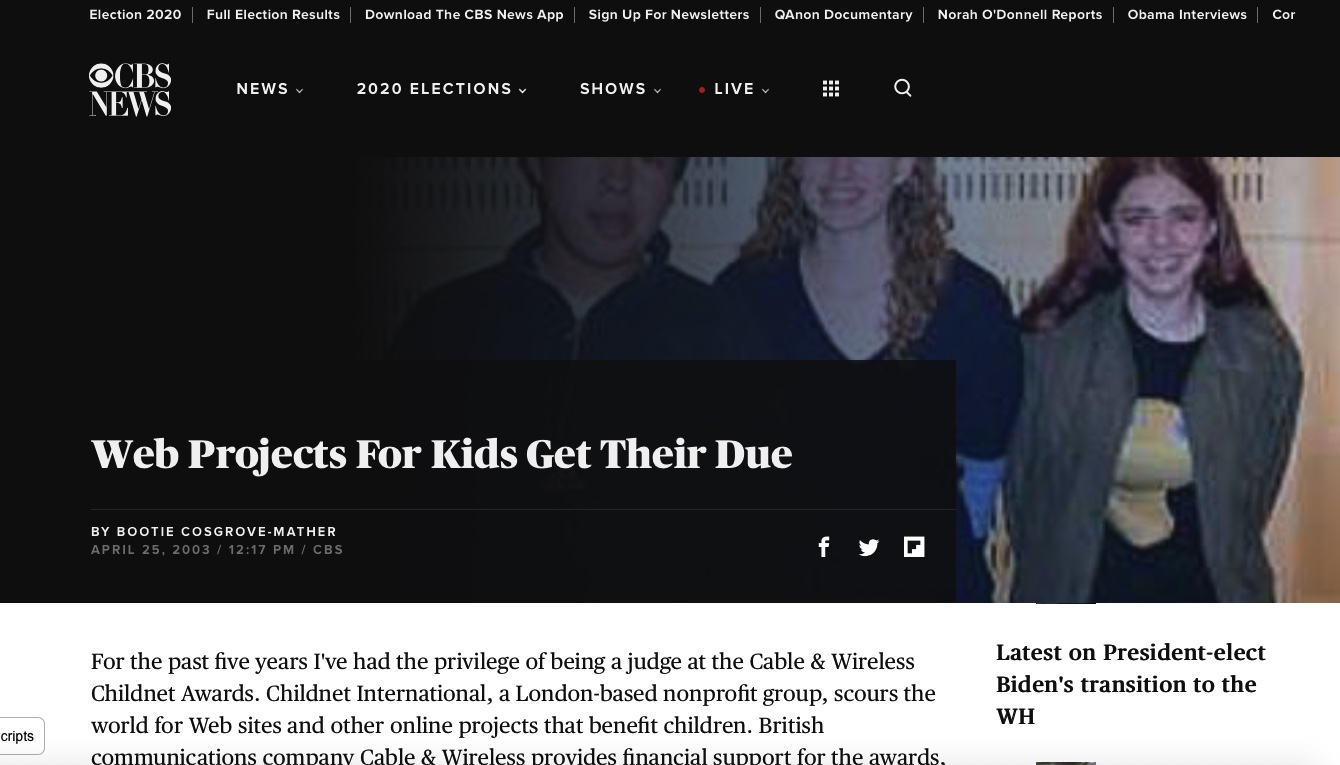 "Web Projects For Kids Get Their Due", CBS News, April 25, 2003. "First place in the not-for-profit category went to Britain's largest children's hospital, Great Ormond Street Hospital here in London (www.gosh.nhs.uk/kidsandteens). There is nothing fun about being sick, yet this child-friendly site is both entertaining and educational. It also gives young patients an opportunity to interact in a secure environment."
"Web Projects For Kids Get Their Due", CBS News, April 25, 2003. "First place in the not-for-profit category went to Britain's largest children's hospital, Great Ormond Street Hospital here in London (www.gosh.nhs.uk/kidsandteens). There is nothing fun about being sick, yet this child-friendly site is both entertaining and educational. It also gives young patients an opportunity to interact in a secure environment."
ORCID iD: https://orcid.org/0000-0001-5311-1052
© David South Consulting 2020
